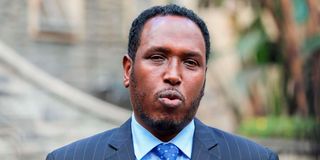Where is the truth in term limits talk?

Fafi MP Salah Yakub at Parliament Buildings, Nairobi on November 8, 2022. As would have been expected, the suggestion by rookie legislator Yakub that presidential term limits be done away with raised great consternation among Kenyans who were not sure whether it reflected the views of the ruling party UDA, whether it was a trial balloon, or whether it was merely the sentiment of a lone ranger seeking his 10 minutes of fame.
As would have been expected, the suggestion by rookie legislator Salah Yakub that presidential term limits be done away with raised great consternation among Kenyans who were not sure whether it reflected the views of the ruling party UDA, whether it was a trial balloon, or whether it was merely the sentiment of a lone ranger seeking his 10 minutes of fame.
The proposal to substitute the constitutional term limit with an age limit may have been merely capricious or deadly serious, but it certainly wasn’t ignored.
What is surprising is that this potentially dangerous missile was launched by a man whose priorities appear to be completely lopsided. He represents a constituency which is highly underdeveloped due to the murderous activities of al-Shabaab terrorists.
Fafi is sparsely populated – it has fewer than 100,000 souls – and its school system is broken because teachers from outside Garissa County are unwilling to work where they become easy targets – yet instead of attending to those problems, he wants to prescribe Kenya’s future governance through a constitutional amendment. Obviously, something isn’t adding up.
Benefit of the doubt
Yet, we should give Mr Yakub the benefit of the doubt, for he may know something the rest of us don’t. While it is reassuring that the ruling Kenya Kwanza Alliance, UDA specifically, has disowned the man’s utterances as personal, unease persists, especially in the Azimio camp, and even among others who lived through former President Daniel arap Moi’s 24-year tenure in office.
They watched him metamorphose from a benevolent dictator into a brutal despot who suppressed all dissent and they could do nothing about it until 1991.
Could it be that there actually is something like that? The MP could not have woken up in the morning and, of his own volition, sought to void Article 142 of Chapter 9 of the Constitution, which is meant to cure the anomalies associated with longevity.
They have a right to be skeptical. But at the same time, those proposing this drastic solution to a non-existent problem are also within their rights. After all, freedom of speech is also enshrined in the same Constitution.
Just what is wrong with trying to do away with constitutional term limits? Why shouldn’t a “popularly elected” leader seek to entrench himself in power? Maybe a look at how other African countries have dealt with the issue will provide the answer.
Most of them, with the exception of Ethiopia, Liberia and South Africa, were colonised by imperial western powers between 1884 and 1914. But by 1964, most were free, except for Angola and Mozambique. The founding fathers of these countries did not embrace term limits, and so they ruled until they either died of old age, were toppled in bloody coups, lost elections, or just retired.
However, in the 2010s, the Arab Spring that affected all the dictatorships in northern Africa –Egypt, Tunisia, Libya, Morocco and most of the Arab world – also had an effect on countries south of the Sahara. A wave of longing for political pluralism hit these countries, which had turned into single-party dictatorships, and the dictators could not withstand it.
When the agitation for constitutional reforms hit a crescendo, the evolving new order insisted on instituting term limits to ensure that the people would hold elections after every four or five years, and change their leaders after every eight or 10 years of incumbency.
Today, of the 54 countries in Africa, only four –Morocco, Swaziland and Eswatini (which are hereditary monarchies), and five others, which are under military rule (Chad, Mali, Guinea, Sudan and Egypt) do not observe term limits. The rest respect these limits, except for Uganda, which under President Yoweri Museveni has removed them altogether, and Rwanda, which instituted them in 2015, but in such a manner as to allow its President, Paul Kagame, to rule until 2034 if he so wishes. Eritrea is another country which has never known democracy since it broke away from Ethiopia in 1994.
Life presidents
All in all, most African countries have opted for term limits, which are between 10 and 14 years, but there are a number of holdouts which set unlimited five-year or seven-year terms. This simply means that after such periods, they dutifully hold elections, but the incumbent is free to contest for election after each term until death, meaning such individuals can easily become life presidents without infringing on their countries’ constitutions. In short, whatever the proponents of such a change have in mind for Kenya, precedents have already been set in some African countries, and they are not pleasant to contemplate.
The elephant in the room, in our case, is whether Kenyans are willing to approve such a move through a referendum. Apparently, they are not, judging from the hullaballoo that greeted the proposal by the neophyte MP.
The reason why most of Africa – and the world– has opted for term limits is that the only way rulers can keep power is by suppressing the will of the people through brute force. That is how totalitarianism is born and reigns of terror become the norm.
Mr Ngwiri is a consultant editor; [email protected]





